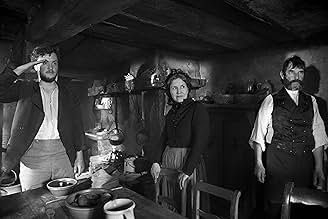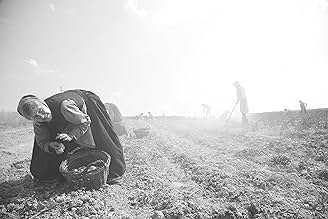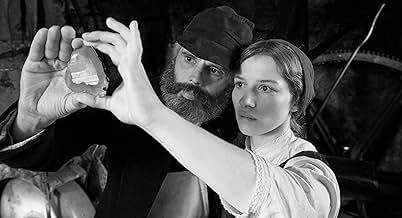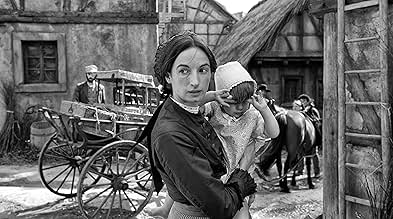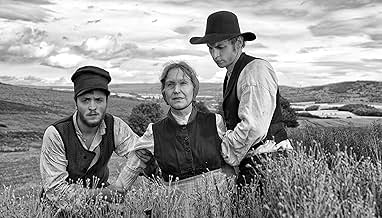ÉVALUATION IMDb
7,9/10
1,6 k
MA NOTE
Ajouter une intrigue dans votre langueJakob longs for a new life for himself and his troubled family in Brazil.Jakob longs for a new life for himself and his troubled family in Brazil.Jakob longs for a new life for himself and his troubled family in Brazil.
- Director
- Writers
- Stars
- Prix
- 9 victoires et 8 nominations au total
Avis en vedette
I won't write a long panegyric here: I can just say that if you liked the other "Heimat" installments, you will like this "prequel" as well. And if, like many viewers, you watched the previous films with an almost religious devotion, you will feel the same way about this one (actually, two).
Somehow Reitz has found the secret of putting his viewers deeply into the situation to the point where you really do feel "you are there" -- and he can do this whether the setting is contemporary, early 20th century or, as here, in the 1840's.
The first installment is admittedly a little long, but there is ample payback in the second, which seeing the first is necessary in order to set up the situation.
Somehow Reitz has found the secret of putting his viewers deeply into the situation to the point where you really do feel "you are there" -- and he can do this whether the setting is contemporary, early 20th century or, as here, in the 1840's.
The first installment is admittedly a little long, but there is ample payback in the second, which seeing the first is necessary in order to set up the situation.
10harvbenn
How many unforgettable images can Edgar Reitz create? Country girls given coins, stare dumbly into their palms. A girl with a malformed leg is ostracized. Country people protest "Liberté!" to returned Prussian authorities. A stone cutter becomes mute on his way to oblivion, but first he cuts an agate slice that contains the world. Where do Reitz, and Casting Director An Dorthe Braker (Downfall, Bader-Meinhof Complex), find actors who seem to step out of a time machine? Where does Reitz get the poignancy of turns of fate changing lives utterly in a world where everything is grown, pounded, turned, and wrested from the earth, if not by yourself and your family, by others who you've known all your life? Under the comet of 1843, hawkers sell passage to paradise to people who never once left the Hunsruck. The damson berries are harvested, and youths become intoxicated on music and dancing. A Prussian lackey reads a hateful decree to an empty street. A lone rider brings more emigration papers. Neighbors and families walk beside their wagons, to Rotterdam and beyond on a journey they cannot comprehend except that there is no return. In Schabbach, the remaining Simons endure, and repair and improve the family smithy. A letter arrives from Brazil after 13 months, and is read to the astonished gathering. We are in Schabbach to witness all of this.
As a companion to the outstanding Heimat TV series, this film has immense value. We see an exquisite portrait of rural life in the Hunsrück during the troubled 1840s. These were troubled times through much of Europe when rural poverty was severe, and oppression by the landed gentry was ruthless.
But this is more than just a story about a small village not far from the Rhine. Reitz' entire work - the three Heimat series and this prequel - is one of greatest cinematic endeavours of our times. The beauty of the photograpy is unsurpassable, even by the standards set by Ingmar Bergman's wonderful filmographer Sven Nykvist The story lines are deftly crafted and the characterisation is faultless. Enjoying a work of such stature has been a wonderful experience
But this is more than just a story about a small village not far from the Rhine. Reitz' entire work - the three Heimat series and this prequel - is one of greatest cinematic endeavours of our times. The beauty of the photograpy is unsurpassable, even by the standards set by Ingmar Bergman's wonderful filmographer Sven Nykvist The story lines are deftly crafted and the characterisation is faultless. Enjoying a work of such stature has been a wonderful experience
This may be the finest film I have seen in years. Four hours and I wanted more. The story, characters, script, photography, acting, history are so artfully done, it is hard to imagine how to have made it better (or shorter). The Industrial Revolution had yet to reach Prussia, but in the midst of this backward village, a romantic and scientific mind emerges, who becomes our hero. Everything appears to be historically accurate with a bit of fantasy thrown in to bring brightness to the basic dreariness. How does Jakob become proficient in Spanish and English? Not important. But how does he become a master of Amazonian native languages and carry on a correspondence with the great Alexander von Humboldt! Well that's just a special filmmaker's dream we accept with all the mundane reality. All in all a wonderful film.
Sometimes a movie has to take four hours. If you stay that long, you not only learn to know the characters, they get under your skin.
A Prussian village. Not boiling yet, because 1848 revolts are some years away, but there are signs. So far people just emigrate, to Brazil in this case, leaving centuries of traditions behind. A sign of something arriving. The minds aren't satisfied.
But the main story is about the village, as a small society and universe there the borders are too close. But the film is anyway focused on individuals. Trying to get shelter from the storm. Which goes on in their souls
A Prussian village. Not boiling yet, because 1848 revolts are some years away, but there are signs. So far people just emigrate, to Brazil in this case, leaving centuries of traditions behind. A sign of something arriving. The minds aren't satisfied.
But the main story is about the village, as a small society and universe there the borders are too close. But the film is anyway focused on individuals. Trying to get shelter from the storm. Which goes on in their souls
Le saviez-vous
- AnecdotesThe strange brass instrument played by Florine at the Smearcase Fair is an ophicleide.
- ConnexionsFollows Heimat: Eine Chronik in elf Teilen (1984)
Meilleurs choix
Connectez-vous pour évaluer et surveiller les recommandations personnalisées
- How long is Home from Home: Chronicle of a Vision?Propulsé par Alexa
Détails
- Date de sortie
- Pays d’origine
- Sites officiels
- Langue
- Aussi connu sous le nom de
- Home from Home: Chronicle of a Vision
- Lieux de tournage
- sociétés de production
- Consultez plus de crédits d'entreprise sur IMDbPro
Box-office
- Budget
- 8 000 000 € (estimation)
- Brut – à l'échelle mondiale
- 1 601 058 $ US
- Durée3 heures 51 minutes
- Couleur
- Rapport de forme
- 2.39 : 1
Contribuer à cette page
Suggérer une modification ou ajouter du contenu manquant







